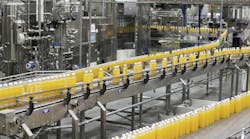As today’s pharmaceutical manufacturers face strict quality and safety regulations, pricing pressure and tighter delivery schedules, drug makers are homing in on production costs and efficiency more than they have in the past. This has been particularly important over the last 12 months — and the pressures of the COVID-19 pandemic present a pivotal point for the industry. It has demonstrated the need for heightened efficiency and reliability to bring drugs to market quicker — something that is now top of mind.
Pharmaceutical manufacturing is a complex process, focusing on reducing supply chain disruption, increasing batch capacity and reducing batch losses. There are a variety of factors that can negatively impact a pharmaceutical company’s ability to ensure the supply of end products. This includes equipment failures due to changing operating conditions and the impact on process health, which can result in costly production losses and disruptions to supply. So how can pharmaceutical manufacturers prevent this and improve plant process efficiency?
The answer lies in advanced analytics, like artificial intelligence (AI), to maintain asset reliability and ensure process health. Although, putting this technology into action is proving to be a challenge among pharmaceutical companies according to a recent survey from asset optimization software company, AspenTech.
Despite challenges in application, research shows AI can help bring new drugs to market quicker
The research, which surveyed 300 pharmaceutical industry decision-makers in the US, UK, Germany, France, Spain and Sweden, found that 50% of European and U.S. pharmaceutical manufacturing companies are aware that AI can help bring new drugs to market more rapidly and securely, but 96% face challenges with using leading-edge technology to derive value from their data. In fact, almost a third (31%) say they lack consistent data structures that make implementation easier or have high levels of unstructured data that are more complex to handle. This indicates a disconnect between the desire to utilize AI, and not having the specific tools and technology in place to execute. Many organizations don’t have a full strategy or complete data structures to implement this technology — nearly half (49%) of all executives surveyed say their company has no overarching strategy for AI.
It is no surprise that pharmaceutical manufacturers have traditionally found it difficult to quickly adopt newer digital technology. The pharmaceutical industry is complex and well-established in nature, so it has typically been reluctant to take on new ways of working with advanced technology. Although, pharmaceutical executives now realize the importance technology plays in speed of delivery and efficiency. More than four-in-ten (43%) pharmaceutical executives believe that if companies in their industry fail to learn the lessons of AI and machine learning (ML) adoption from other sectors, they will be in severe financial trouble within two years.
Advances in AI will relieve growing pressures of the industry and can break down the barriers between systems and types of data within production processes and supply chains. It is critical for organizations to reimagine their digital culture and think more holistically about what data will add across all aspects of drug manufacturing.
The role of AI in pharma manufacturing
Digital solutions can help pharmaceutical manufacturers in a variety of ways. Not only can they prevent equipment breakdowns and ensure process consistency, but they can also optimize production overall and protect the supply of product to customers. These selected solutions not only address all facets but can also be implemented in months instead of years.
Many pharmaceutical companies are turning to advanced analytics, AI and ML to help them increase equipment reliability, prevent manufacturing losses, find the “hidden factories” (capacity) inside the plant through yield, quality and cycle time improvements, and, as a result, reduce capital expenditures (CAPEX).
This technology can reveal opportunities to reduce manufacturing costs across all stages of the product lifecycle, allowing pharmaceutical companies to save money. Whether using multivariate analytics to identify process degradation and its impact on quality or predicting final product quality to reduce lab testing lag times, these techniques offer pharmaceutical companies a competitive advantage.
Predictive maintenance and process multivariate analytics
Two ways that advanced analytics can help to maintain asset reliability while maintaining process health is predictive maintenance and process multivariate analytics.
Predictive maintenance solutions use advanced analytics to identify the signs of impending equipment failure and warn maintenance teams in advance. This allows drug makers to plan repairs, adjust production and avoid unplanned failures that would result in lost product. Easy-to-use predictive maintenance software captures and analyzes data quickly, making best use of all knowledge and skill sets within an organization. Drawing on data history, past work orders and known failure modes, plant staff can develop agents that identify anomalies and signs of pending failure.
Alternatively, process multivariate analytics evaluates the complex variables in batch production and determines which are critical to quality, allowing pharmaceutical processors to keep batches on and thus drive greater yields. These tools allow pharmaceutical companies to safeguard security of supply, optimize production and control costs.
Pharmaceutical manufacturing is an industry that is constantly evolving and growing increasingly complex with time, so knowing how to quickly adopt these processes is key. By understanding how to increase effectiveness, reliability and output while maintaining quality — with advanced analytics — companies will hold a sustainable competitive advantage while protecting their bottom line.
David Leitham is SVP and GM at AspenTech.


